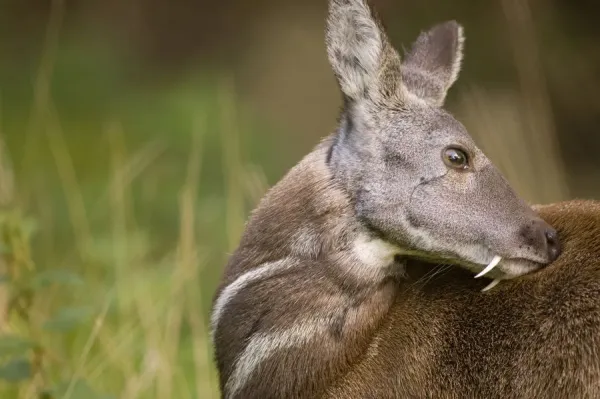
Moschus
Latin name: Moschus moschiferus
Short name: Mosch
Common name: Musk Deer Secretion | Musk | Moschus | Musk Gland Extract | Musk Animal
Primary miasm: Sycotic
Kingdom: Animals
Family: Moschidae
- Symptomatology
- Remedy Information
- Differentiation & Application
Prepared from the dried secretion of the preputial gland of the male musk deer (Moschus moschiferus), native to the mountainous regions of Central and South Asia. The substance is powerfully aromatic, dark brown, and historically used in perfumery and traditional medicines.
Formerly used in high-end perfumery and traditional Asian medicine for hysteria, epilepsy, and cardiac conditions. Now largely replaced with synthetic substitutes.
First proved by Samuel Hahnemann and detailed in Materia Medica Pura. Further expanded by Hering, Kent, and Clarke.
- Nervous system – especially emotional hysteric states and convulsions
- Respiratory system – constriction, asthma, suffocative spasms
- Female reproductive system – hysteria, fainting, spasmodic conditions
- Cardiovascular system – palpitations, syncope, collapse
- Muscular system – spasms, trembling, catalepsy
- Cold air
- Fanning
- Loosening tight clothes
- Lying quietly
- Eructation (temporarily relieves chest symptoms)
- Nervous discharge (crying, hysterical expression)
- Excitement, emotional tension
- Warm rooms or coverings
- Constriction (tight collars, corsets)
- Touch and contradiction
- Mental exertion
- Odours (especially strong perfumes)
- Ignatia – More internalised grief, sighing, and silent suffering; Moschus is more dramatic, expressive, and spasmodic
- Lachesis – Also expressive, < heat, and worse from constriction, but more jealous, loquacious, and congested
- Asafoetida – Nervous hysteria with flatulence and globus, but more reversal of symptoms and foul discharges
- Valeriana – Nervous states with restlessness and strange sensations, but less violent and not as icy
- Crocus – Alternating moods and hysterical episodes, but more sanguine and joyful extremes; Moschus is colder and more fearful
- Complementary: Ignatia, Valeriana, Coffea
- Antidotes: Camphora, Nux vomica
- Follows well: Ignatia, Pulsatilla
- Precedes well: Sepia, Lachesis, Platina
Moschus is the archetypal remedy of hysterical drama and emotional tension embodied in physical form. It deals with the explosion of pent-up nervous energy, often in ways that seem theatrical, irrational, or abrupt. Beneath the surface lies a fragile sensitivity, a body and psyche easily overwhelmed by life’s intensity. There is a deep contradiction: an urge to control and contain, but an inability to suppress. Every emotion finds expression—through the heart, lungs, muscles, or tears.
It is particularly suited for women with exaggerated responses, oppression from clothing or environment, and intense internal storms that must be released—through fainting, sobbing, or spasms.
- Indispensable in hysterical fits with coldness, fainting, or spasms
- Useful in collapse states after grief, fright, or sudden shock
- Excellent remedy for oversensitive nervous systems, especially in theatrical children or anxious women
- Consider for asthmatic symptoms from emotional triggers
- Coldness, flatulence, and tightness accompany nervous distress
Mind
- Hysteria, with fainting
- Laughing and weeping alternately
- Fear of death during palpitations
- Sensitive to contradiction
Head
- Congestion, emotional
- Headaches, hysterical origin
- Vertigo, with fainting
Chest
- Oppression, as if suffocating
- Palpitations, from excitement
- Constriction, hysterical
Extremities
- Twitching, hysterical
- Coldness of limbs
- Rigidity, cataleptic
Skin
- Cold sweat, face
- Urticaria, nervous origin
Generalities
- Fainting, from emotions
- Worse warmth, better cold air
- Spasmodic conditions, hysterical
Samuel Hahnemann – Materia Medica Pura: Original proving, including hysterical, respiratory, and circulatory phenomena
James Kent – Lectures on Homoeopathic Materia Medica: Hysterical emotional profiles, cardiac themes
John Henry Clarke – Dictionary of Practical Materia Medica: Spasmodic affections, hysterical crises, modalities
C. Hering – Guiding Symptoms: Coldness, syncope, dramatic presentations
Margaret Tyler – Homoeopathic Drug Pictures: Emotional expressiveness and remedy comparison to Ignatia and Platina
